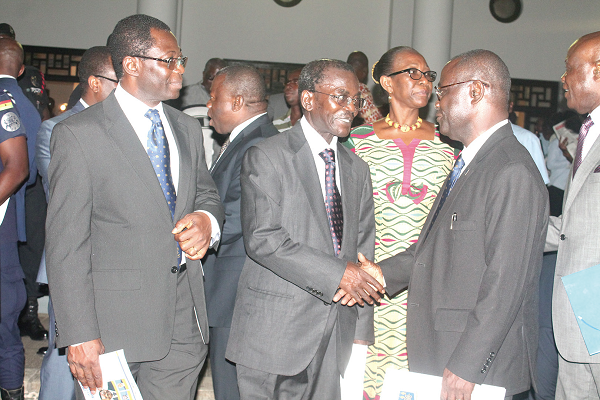
Don’t entertain corruption in any form
A former Governor of the Bank of Ghana, Dr Paul Acquah, has urged Ghanaians to persist in their demand for integrity from public officials and institutions.
Advertisement
“It is up to citizens, you and I, to insist on our rights as principals in the game and ensure that good governance practices are followed by our agents, the political leaders and public decision makers,” he told his audience at the 2017 Alumni Lecture of the University of Ghana (UG), in Accra last Thursday.
“It must be the sacred right of citizens to be alert and to ensure that no one appropriates the public good for personal gain. That is truly the essence of surveillance by the citizenry,” Dr Acquah said.
He was speaking on the topic, “Corruption, culture and national development- an interrogation of Africa’s experience.”
Clarion call
He said for the current economic growth in some African countries to be sustained, there had to be a clarion call by the citizens to public office holders not to take corrupt decisions, but uphold honesty and integrity and be faithful in their oath of office.
He urged Ghanaians to make those statements their daily clarion call.
Applause
Dr Acquah’s delivery drew applause from the audience, mainly the alumni of the UG and other universities’ continuing students as well as students of Accra Academy.
Also present were the current Governor of the Bank of Ghana, Dr Ernest Addison, and his two deputies, members of the University Council and current and former chancellors and pro-vice-chancellors of the university.
Dr Acquah, an alumnus of the UG, began the lecture by reminiscing his entry into the university as one of the first crop of graduates to be issued “home-grown university of Ghana degrees.”
He recalled the time when the UG had to break off its special affiliation to the University of London, forgo the special status it derived from that affiliation and become independent.
Integrity in decision making
Dr Acquah used that experience to show how the decision made at the time had been executed for the welfare of Ghana and to serve the purposes of tertiary institutions in the country.
“It wil be fair to say that that policy action was motivated by the best interest of the nation and specifically, to serve the purposes of the tertiary education system in the country,” he pointed out.
He said that the line of reasoning in decision making was normally right as it was based on fundamental principles of trust in the integrity of the institutions, of an entrenched belief in leaders acting as agents in good faith and trust of citizens and of policies and actions of leaders, deriving from a genuine intent to promote the interest of the mainstream and protect its assets.
“Indeed, that is a hallmark of a government system that is working well, when citizens can accept in confidence that such decisions are made in good faith with little or no self- interest, bias or corrupt intent,” he said.
Corruption
Dr Acquah defined corruption as the abuse of public office for private gain, and warned duty bearers that the quality of their decisions depended on how the economy fared.
He said good transparent decisions, taken in the interest of the people, enriched economic growth.
However, “poor decisions diminished it and corruption compromised it,” he stressed.
Dr Acquah said corruption was a flashing signal that something was wrong and that injustice was being perpetrated.
“Corruption has a foul smell and citizens can smell it when it is there,” he pointed out, adding that it was evident in opulent lifestyles of public office holders.
He urged citizens not to entertain corruption in any form, reminding them that corruption thrived when there was no surveillance of public power.
Legacy
The Vice Chancellor of the UG, Prof. Ebenezer Oduro Owusu, urged all heads of institutions to endeavour to leave a good legacy, while the Chairman of the UG Alumni Association, advocated an end to the demands for sexual favours from female students and young workers from institutional heads since that was another form of corruption.
Writer's email: caroline.boateng@
graphic.com.gh